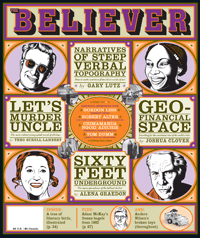Impossibly good new BELIEVER is out...
 The January Believer has been unleashed! Dzyd Theo has an instant classic, twining personal memoir with the quest for the mysterious author of Let's Kill Uncle; you need to read this piece! Plus there's an unusual interview with Gordon Lish; a potentially life-saving megadose of Gary Lutz—
The January Believer has been unleashed! Dzyd Theo has an instant classic, twining personal memoir with the quest for the mysterious author of Let's Kill Uncle; you need to read this piece! Plus there's an unusual interview with Gordon Lish; a potentially life-saving megadose of Gary Lutz—A word that I remember coming out of my parents’ mouths a lot was imagine—as in “I imagine we’re going to have rain.” I soon succumbed to the notion that to imagine was to claim to know in advance an entirely forgettable outcome. A calendar was hung in the kitchen as if to say: Expect more of the same.
...reviews of Jack Spicer and others; interviews with Chimamanda Ngozi Adichie and translator Robert Alter; "much more." Greil Marcus inadvertently tells me the name of a song that popped up on my Shuffle the other day—it was great and strange and I didn't know what it was (Fiery Furnaces, "Oh Sweet Woods": ).....Don't miss this amazing Joshua Clover piece (another instant classic!) on the financial crisis—here's how it starts:
We could begin in fifteenth-century Genoa with the invention of fixed currency and modern banking, or with the first foreclosure of this current crisis just a couple years back. I’m going to begin near the middle: in the nineteenth-century United States, with banks and railroads.Railroads being too pricey even for the well-heeled capitalist, banks that could provide grand lines of credit became major players. This concert of powers dominated the nation’s finances, extending the financial network even as they exerted increasingly centralized control. They were only too willing to loan the money forward, both for stakes in the enterprises and in the happy knowledge that the intercontinental railroad would open up new markets. Credit doesn’t just allow for such expansions; it requires them, to conjure its necessary returns.
The relationship was so intimate that sometimes it collapsed into singularity. Chartered in 1833, the Georgia Railroad and Banking Company built a then-lengthy line from Atlanta to Augusta; the firm survives as a real-estate concern. Its rail system now belongs to massive CSX Transportation; the banking division was a part of Wachovia, which was nearly obliterated this September and has under Federal duress recently merged with Wells Fargo, which started in 1852 as a transport and banking company. Two great tastes that go great together.
The salient point is this: that the expansion of the rail systems throughout physical space, sewing together the continental United States with threads of iron, was identical to the credit-fired expansion of financial networks. Not parallel developments, but one and the same. Geopolitical space and finance space are simply different dimensions of the same structure, the same unified market—what we might call geofinancial space.
New year's resolution: I will subscribe to The Believer for a mere $45 and if I already subscribe I will get subscriptions for my friends.
Labels: Chimamanda Ngozi Adichie, Fiery Furnaces, Gary Lutz, Gordon Lish, Greil Marcus, Jack Spicer, Joshua Clover, Robert Alter, The Believer, Theo Schell-Lambert

1 Comments:
Eeek, the Let's Kill Uncle article is so good! I read it last night until I couldn't keep my eyes open any more, and then I read it when I woke up. Now I have a single paragraph left of it, and I'm holding off finishing it, because I don't yet want it to end...maybe not until I've found a copy of the actual book...
Post a Comment
<< Home